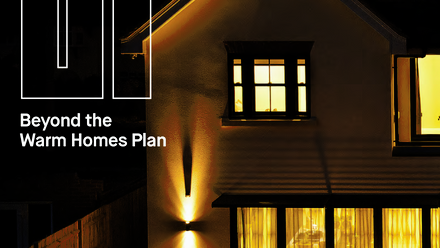CIC calls on government to improve plan for climate resilient homes
It has urged that government must work with industry to support the necessary upskilling needed to achieve this and provide guidance not only for tradespeople and designers but to consumers who will be unfamiliar with some of the new technologies deployed.
CIC's response emphasised:
- Support for post-occupancy evaluations and the use of a delivered energy metric which can create a feedback loop with the design predictions.
- Disappointment that the measurement of embodied carbon is not being considered as part of this consultation given that embodied carbon could make up 70% of a new home's whole-life carbon.
- The need for a parallel government strategy is to ensure that appropriate, accredited and trained professionals are available to properly oversee the installation – and maintenance – of energy saving measures such as heat pumps.
- Strong support for the plans to make a definitive switch away from fossil-fuel heating plans but concerns that the options given in the consultation were not aspirational enough.
- The importance of improving standards for homes converted through Permitted Development – particularly on areas such as overheating – and the need for owners and residents to have the same information about their home as buyers of wholly newbuild homes.
The Future Homes Standard and Future Buildings Standard is part of the government's plan to improving the energy efficiency and reducing the carbon emissions of new homes and non-domestic buildings.
The consultation set out the plans for achieving the Standard including technical proposals for changes to the Building Regulations, the associated Approved Document guidance and calculation methods.
As well as covering new homes and non-domestic buildings, some sections are relevant to existing buildings including those on material change of use, real-world performance of homes and Part O which addresses overheating.
Professor Stephen Hodder, CIC Climate Change Committee Chair, said:
This Standard is likely to be the government's legacy and having waited so long we need to ensure that we get it right as we could be building or converting millions of homes under the proposals. These homes are likely to see the worst impacts of climate change and will need to be robust and resilient through this, and therefore they need to be future-proof or at least adaptable.
Professor Tony Crook, Chair of CIC's Housing Panel, added:
We support high quality retrofit and this extends to materials change of use, which can also mean less construction waste and lower whole-life carbon. But homes created in this way need to be safe, sustainable and nurture sustainable communities. We do not need homes that will be obsolete in a decade's time because the structure is unsound and the conversion has been carried out in a way that puts resident's health at risk.
Inactivity on energy efficiency has been costly for consumers in terms of rising bills, yet robust measures to improve this could also help the public purse, with BRE reporting that investments to improve some of the worst quality homes could save the NHS around £1.4bn in first year treatment costs alone. We urge government to seize the opportunity to create a positive housing legacy.





